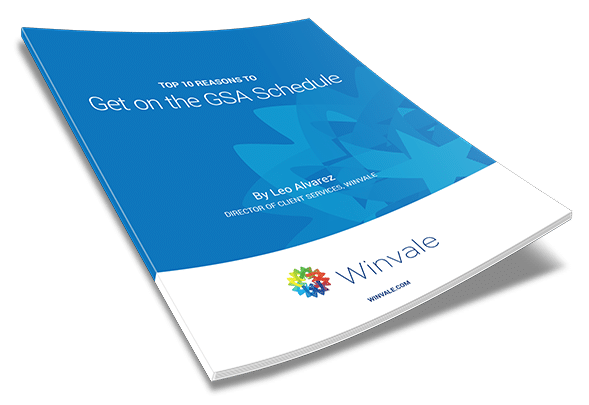Winvale Blog
The latest insights for government contracting success, GSA Schedule assistance, & IT Manufacturer support.

Technology | Resources and Insight
By:
The Winvale Team
May 5th, 2016
WASHINGTON, D.C., May 5, 2016 – Winvale, the leading provider of strategic and technology solutions for government, was named Tech Company of the Year by the Chesapeake Regional Tech Council (CRTC) at the organization’s annual awards celebration on April 28, 2016. Winvale was honored for its achievements in strategic business planning, vision and contributions to the Washington, D.C., regional economy.

GSA Schedule | Resources and Insight | GWAC Series
By:
Meghan Gallagher
March 1st, 2016
This spring we’ll be anxiously awaiting the release of Alliant 2 and Alliant 2 Small Business (SB). These GWACs are specific to comprehensive information technology solutions with a total estimated value of $65 trillion between FY2018 and FY2028.

Do you know what the real benefits of being on the GSA Schedule are? Learn the top 10 reasons (and advantages) why you should consider it.

GSA Schedule | Resources and Insight
By:
Meghan Gallagher
February 23rd, 2016
Ask any government contractor what they think of partnering or teaming and they will probably murmur something close to, “It’s probably a good idea.” There are a lot of benefits to partnering and almost every government contractor understands the basic concept. However, many also have false perceptions of what it takes to form a partnership, believing it’s daunting, difficult and not a priority for their government sales strategy.

Government | Resources and Insight | Contracts
By:
Carina Linder
January 22nd, 2016
Now that you’re a GSA contract holder you may have noticed that there’s quite a bit of red tape to work around. Certain performance orders issued under your GSA contract may require you to travel out of area. If this is the case for your organization, there are a few things to keep in mind when it comes to travel expenses and per diem charges.

Government | Resources and Insight | Contracts
By:
Meghan Gallagher
January 19th, 2016
Government contractors are painfully aware of the amount of time it takes to search for opportunities that are a good fit for their business. However, while research is an acknowledged key to success, rarely do contractors dedicate enough time for it. Why is this? Probably because knowing how much time to spend with each resource is a mystery to most.

Resources and Insight | NASPO ValuePoint | Contracts
By:
David Baldino
November 17th, 2015
The ImmixGroup recently published an article that gave an overview of cooperative purchasing and some contract vehicles associated with it. In this overview they were able to touch on some points about the National Association of State Procurement Officers (NASPO) ValuePoint program. Immix, who has a very established presence in the federal market, highlighted advantages of utilizing cooperative purchasing contracts and the amount of dollars procured through NASPO ValuePoint. I will highlight NASPO ValuePoint from an inside perspective, as I have first-hand experience working in the program, working with State Procurement Officials and currently managing several companies within the program.
Copyright Winvale | All Rights Reserved